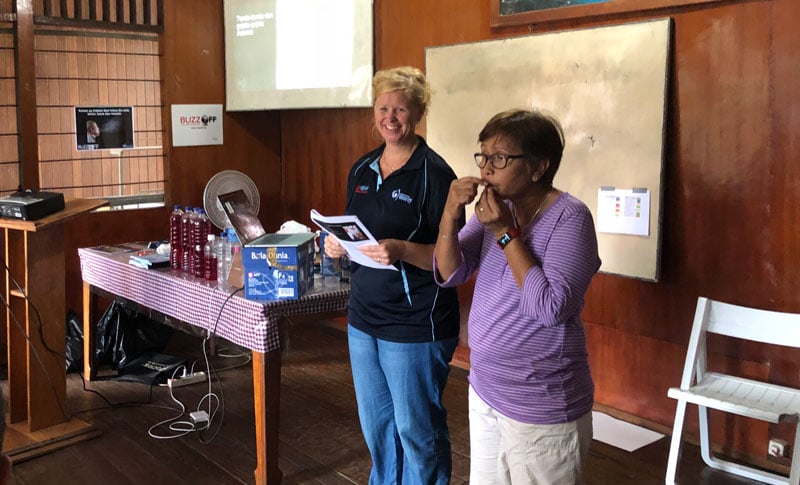This summer for 3 weeks we’ve been to Papua, one of the islands of Indonesia. For as far as we have been, the island has beautiful sceneries and lovely people.
Last year we were asked to train people to become malaria prevention trainers. This group of people then in turn want to train others to become malaria prevention workers. So we set up a program of 3 weeks: in the first week we would train a group to become prevention workers and from that group they could join the second week to become trainers themselves. The last week, the new trainers themselves would give lessons to a new group of people. It all worked out well.
That malaria is a big problem on the island, turned out when we found out that 100% of our participants had malaria several times. Just as in our culture a cold and flu is a normal incident, malaria is that in Papua. Only the consequences of malaria can be many times more serious. A number of participants have had miscarriages due to malaria and some of them had also lost family members (including children) of malaria. Malaria can also cause long term effect, especially when it had caused brain demage.
In the preparations for this trip we found out that there is a high resistance of the malaria parasites in Papua. We learned that as soon as people feel better, they stop taking the medication and save the rest for the next time. Or they take only half a pill instead of a whole. Some people do not take their medication at the right time or take, for example, 2x a day their pill instead of 3x. Some find it hard to take medicine and stop as soon as they feel better. Because the malaria parasites are in this way not totally killed in the body, they get used to medicine. So now when a patient with malaria is bitten by a mosquito and this mosquito bites another person, the parasites can be only fight off by a stronger medicine.
Fortunately, the lessons have given a lot of clarification about malaria and the medication. They now know where it comes from and how they can reduce malaria on their island and the importance of the correct intake of the right medicines.
The first week we had about 40 participants, 16 of whom also followed the training course successfully in the second week. The last week, these 16 participants have given 2×2 days of information in two different places. We realized that when these teams are now entering the jungle to bring the gospel, they now know what they can do if they come across people with malaria. They now know how they can reduce and even eredicate malaria in the small residential communities in the mountains. They can share with the people how they can protect their children, pregnant women and the elderly against malaria and that it is no longer necessary for people to die in their community or be limited for life by the consequences of malaria. In week 3 we sailed to a village with our newly trained students in boats. There we saw how our ‘students’ informed the people about malaria. Of course we were very proud of them and glad that they enthusiastically passed on the message. One of the the last days we sat around the table with the new trainers and talked about ‘how to proceed now’. Great to hear their ideas, their enthusiasm to inform people about malaria and their vision to expand it further. We continue to follow them from Australia and the Netherlands and we keep in touch with the group. One of the biggest dilemma’s for them is that it is very difficult to get to impregnated mosquito nets transported to the Island. A net is of main importance to reduce malaria and we want to ask you to pray with us that God will open ways to have these nets coming in.

